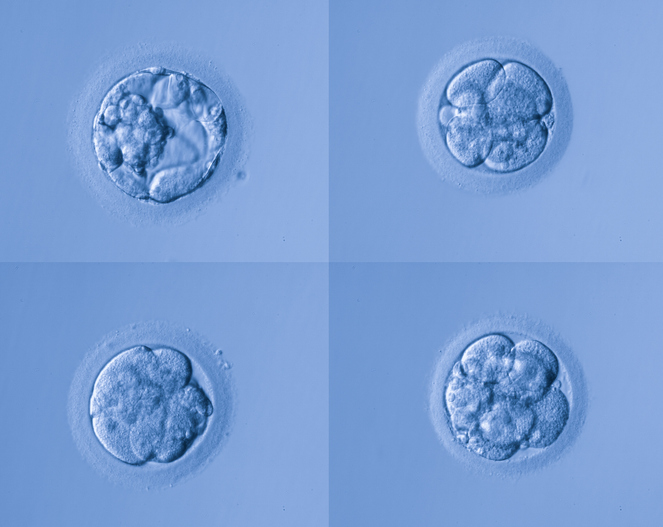

Worries about egg donation risks can hold you back from joining our Split Program, in which you can freeze your eggs for free in exchange for donating half to people who need help growing their families. But just how risky is egg donation? Are the rewards of helping grow a family enough to outweigh them?
Here’s what the science says about the risks along with our take on some potential benefits.
Egg donation risks
Overall, egg donation is considered a low-risk procedure and there are a number of steps along the way designed to ensure your safety. A 2017 Fertility and Sterility research study looked at more than 23,000 egg retrieval procedures performed on women in hospitals and fertility centers. Overall, the study found an overall complication rate of just 0.4%.
The first stage of the process is a series of screenings to make sure you are prepared for what lies ahead. You’ll undergo a general interview, blood testing, and a psychological assessment to make sure you are physically and mentally up for everything that egg donation entails. Importantly, these screenings help flag potential issues early, and mitigate any larger risks.
The greatest risks exist for those who have pre-existing health conditions that put them in a higher risk category, these women are unlikely to pass the initial screening process.
For those who are deemed healthy and ready for donation, the largest risks then lie in the egg production and egg retrieval phases of donation.
Ovarian hyperstimulation syndrome
Just like the process for freezing your eggs, you will be prescribed injectable hormone medications to stimulate the ovaries to produce more eggs. This carries some risk of ovarian hyperstimulation syndrome (OHSS). OHSS is a condition in which the ovaries condition in which the ovaries can swell and fluid leaks into the abdomen, causing pain and discomfort.
Cases of OHSS are rare, occurring in less than 5 percent of women who use these medications. The symptoms are typically mild, causing bloating, nausea, and general discomfort that will go away one to two weeks after your egg retrieval procedure. OHSS cases that require medical attention occur in about 0.1% to 2% percent of women.
Anesthesia risk
Once you’ve produced enough eggs, you’ll undergo a retrieval process at the fertility clinic. This process is outpatient, meaning you can go home that day, and typically only takes about half an hour.
You’ll be under anesthesia for the procedure so it is worth noting that anesthesia does carry risks such as nausea, vomiting, low blood pressure, and allergic reactions. However, risks of major complications from anesthesia are rare, with just 1.1 per million each year across all types of procedures. If you have a history of nausea from anesthesia, talk to your doctor about it beforehand.
Egg retrieval complications
During the egg retrieval process, a fertility specialist will use a thin needle to aspirate eggs from your ovaries. This does come with risk of bleeding, infection or injury to something nearby – such as the bladder or bowels. If this were to occur, surgery may be required to correct the problem. But, as previously mentioned, only 0.4% of women encounter complications during this part of the egg donation process and just 0.29% percent require surgery due to those complications.
More common after egg retrieval is some spotting and discomfort, both of which are temporary. Many women return to work the day after an egg retrieval, although some take a few days to recover.
Will donating eggs affect future fertility?
One common question that potential Split members ask is whether there’s a risk that donating eggs will affect their future fertility. The answer is a solid no.
Not only will donating eggs not affect your chances of getting pregnant naturally in the future, it also won’t lower your ovarian reserve (number of eggs in your ovaries). The eggs retrieved in an egg donation cycle are eggs that would have been lost that month naturally.
As part of our Split program, members donate half of the eggs that they produce during a cycle and keep the other half for themselves — freezing them to use at a later date. The cost of storage is also covered for 10 years.
Other common egg donation concerns
As you consider the Split program, you may have some other non-medical concerns. It's important to think through them before deciding to join the Split program.
Wanting to remain anonymous
How much identifying information you want to share is ultimately up to you, however the advent of DNA testing from companies like 23AndMe and Ancestry.com has made it impossible to guarantee true long-term anonymity. It’s best to make any decisions about donating your eggs with this in mind.
Wanting to know potential donor-conceived children
On the flip side, you may be curious about potential offspring and want to have a window into their world as they grow up. Split members are given the chance to build a plan with intended parents that is comfortable for both parties and ultimately honor and respect the donor-conceived child. That plan can vary from just a holiday card update to regular communication — it really is unique to the parties involved.
Egg donation benefits
The CDC estimates a fifth of women encounter infertility every year and egg donation is a true gift to many families.
If you’re weighing the risks against the benefits, the satisfaction of helping someone else grow their family can be incredibly powerful. As a Split Member, you’ll also have the added benefit of free health screenings and a chance to talk to fertility experts about your own fertility planning.
Lastly, if you choose to donate eggs through Cofertility, you will also be able to keep half of the eggs produced during your cycle, giving you a jumpstart on your future reproductive planning.
Bottom line
Although overall risks of egg donation are low, there’s a lot to think about. It’s important to consider it all and to talk open and honestly with the fertility experts at your disposal.
Making the decision to donate eggs can be a powerful and fulfilling experience. Still, it should only be something you do because you feel comfortable with the process and potential long-term implications. We’d love to be a resource as you consider this process - feel free to reach out with any questions or concerns along the way.










